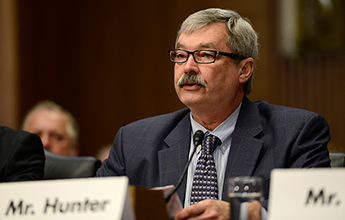
IBEW Utility Director to Senators:
|
 |
| “We don’t have multimillion dollar models for predicting plant closures, but we have common sense and practical knowledge of the system,” IBEW Utility Department Director Jim Hunter told senators at a hearing on the reliability of the electrical grid, called at the urging of the IBEW, the United Mineworkers and the Utility Workers. |
On April 10, the Senate Energy and Natural Resources Committee convened a hearing entitled: “Keeping the Lights On--Are We Doing Enough to Ensure the Reliability and Security of the U.S. Electrical Grid?”
The hearing was held in direct response to a March letter to the committee’s chair, Sen. Mary Landrieu (D-La.) from the IBEW, the United Mineworkers and the Utility Workers.
The unions’ request for a hearing was supported by Sen. Joe Manchin (D-W.Va.) and Rob Portman (R-0hio).
“We [IBEW members] don’t have multimillion dollar models for predicting plant closures,” IBEW Utility Department Director Jim Hunter told senators. “But we have common sense and practical knowledge of the system.”
Testifying as part of a panel that included Nicholas Atkins, CEO of American Electric Power, Hunter recapped the union’s 2011 warning to the Environmental Protection Agency predicting that prematurely removing 56 gigawatts of coal-fired generation could cause blackouts during extreme weather emergencies. The EPA had disputed the IBEW’s numbers. However, the agency now confirms the union’s predictions. The closings will lead to 50,000 direct job losses.
“Our experience enabled us to see what the agency’s models could not,” said Hunter, who informed senators that 80 to 90 percent of the plants scheduled to close were required to run during last winter’s polar vortex to prevent grid disruptions.
PJM, the regional utility organization covering a large swath of the U.S., has not done any winter modeling in over 10 years. “Luck is a poor substitute for proper planning,” Hunter told senators, who also heard from another panel of industry experts focusing on the nation’s readiness to counter threats to the grid’s security from cyber or physical attacks.
Responding to the reliability panel, Manchin linked the coal plant closings to the need, also addressed by Hunter, to replace as many as 100 nuclear power plants by 2050 if their licenses are not extended.
“Where does this leave us? We need coal. We need nuclear,” said Manchin. “We need them along with gas, wind, solar and hydro. But without these two workhorse fuels providing baseload power 24/7, 365 days a year, we will not be able to guarantee the reliability of our grid.” In the face of future weather emergencies, he said, “Make no mistake--the grid will fail and people will die--our elderly and most vulnerable people.”
A member of the Environmental Defense Fund and the CEO of a company invested in renewable energy also addressed the committee. They argued that leaving the nation’s electrical energy grid to the deregulated marketplace would ensure that prices will come down for cleaner energy sources to replace coal, leaving enough supply to forestall any emergencies.
Hunter disagreed. “The electrical industry is still suffering the economic stress fractures caused by the partial deregulation of the industry in the 1990s,”he said, presenting senators with IBEW’s recommendations to help to prevent catastrophic losses of electrical power:
Seasoned and knowledgeable commissioners on the Federal Energy Regulatory Commission who can make changes to the market to ensure adequate supplies of energy.
Better coordination between FERC, the EPA and the Nuclear Regulatory Commission and more flexibility in implementing new rules.
An end to “double jeopardy” facing companies that could be ordered to restart shut-down coal-fired power plants by FERC or regional utility organizations, thus placing them in a position to be sued under the Clean Air Act.
“The IBEW wants clean water and clean air as much as anyone,” Hunter told the committee. While the EPA has extended some deadlines to comply with new environmental regulations, remaining problems, he said, “must now be solved by FERC and Congress.”
![]()